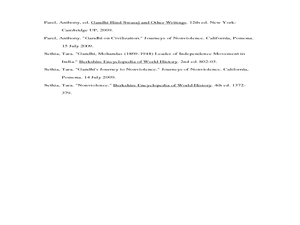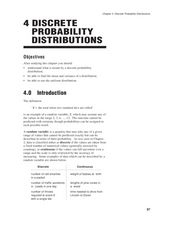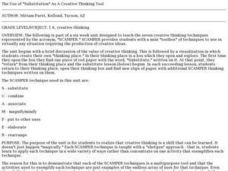Curated OER
Bar Graphs
Third graders examine the main parts of a bar graph and how to round up to the nearest tenth. They make an example of a bar graph and answer questions based on the graph using a list of state capitals and their average temperatures....
Curated OER
Double Exposure Lesson Plan: Artistic Analysis of a Photograph
Students view photographs on Web module, practice answering questions of analysis, and identify artistic qualities of photographs by applying the analysis of elements of art.
Curated OER
Tree Friends
Students are introduced to tree structure and use. They identify their special tree using all senses except sight. Students identify six different internal parts within a cross section of tree trunk (bark, phloem, xylem, cambium,...
Curated OER
Nonviolence and Conflict: Its Importance to Building Community
Students study nonviolence and the values associated with nonviolence. In this social science lesson, students identify the six steps of nonviolence and the six principles of nonviolence as put forth by Martin Luther King, Jr. Students...
Curated OER
Computing with Mathematical Formulas
Students solve problems using formulas. In this algebra lesson, students evaluate numbers using substitution. They graph their answers using a TI and discuss the outcome.
Curated OER
Standard Linear Form
Ninth graders identify and describe the x-intercept as the place where the line crosses the x-axis as it applies to football. They create their own differentiations to reinforce the distinction between the x-intercept and the...
Curated OER
Is More Expensive More Absorbent?
Students consider the question," Is more expensive more absorbent?" For this science lesson plan, students find out through experimentation which paper towel is the most absorbent as well as which one is the best cost value for their money.
Curated OER
A Day at Mount Vernon
Students discover daily life on George Washington's plantation, Mount Vernon. In this compare and contrast lesson, students examine the life styles at four distinct sites at Mount Vernon to become familiar with the people, places, and...
Curated OER
French Fry Run
Student explore estimation and measurement. In this measurement lesson, 2nd graders measure french fries, graph their data, and determine the size of french fries that is the best value. Students practice how to add prices and calculate ...
Curated OER
Propaganda in the 1900's
Students examine primary sources to discover information about life in the 20th century. In this propaganda lesson, students analyze posters from the time period and present their findings to their classmates.
Curated OER
Treaties
Students explore Canadian maps. In this map skills and Canadian history instructional activity, students locate reserves that originated from treaties made while establishing the Saskatchewan First Nation reserve communities. Students...
Curated OER
Pythagorean Theorem
Students solve problems using the Pythagorean Theorem. In this geometry lesson plan, students identify the sides and angles of a right triangle. They find the different trigonometric ratios and solve using sine, cosine and tangent.
Curated OER
Creating Artwork to Explain Environmental Change
High schoolers review artwork that relates to the environment and communicates a value. They view and analyze art by Andy Warhol, Eric Carle and Albert Bierstadt and then create original pieces with an environmental theme.
Curated OER
Let's Go Slopey
Students create a table of values to graph a line. In this algebra instructional activity, students identify the slope and intercept of a linear equation. They use a Ticalculator to graph their function.
Curated OER
Acid Attack
Learners explore the effect of chemical erosion on statues and monuments. They use chalk to see what happens when limestone is placed in liquids with different pH values. They also discover several things that engineers are doing to...
Curated OER
Fur Trade Economics
Learners demonstrate understanding of what the fur trade was and how it was operated, including the bartering process, by participating in a mock trade activity and assessing the value of items based on their needs and wants.
Curated OER
4 Discrete Probability Distributions
High schoolers read and complete problems on how to solve discrete probability distributions. In this probability distributions lesson plan, students read math problem examples and solve them.
Curated OER
Note Taking: Research on the Middle Ages
Learners explore the Middle Ages. In this research skills instructional activity, students research selected Internet sources regarding the Middle Ages and use the provided graphic organizers to take notes regarding the information they...
Curated OER
Challenging Images
Students demonstrate the meaning of self-esteem and individuality. In this character education lesson, students discuss the meaning of self-esteem and self-image. Students are divided into small groups and are shown photographs of...
Curated OER
Fitness Points
Students are given an index card with a warm-up on it for them to complete when they enter the classroom. Individually, they are placed around the room in which they complete the warm-up and assigned a total point value. To end the...
Curated OER
Introduction to Topographic Maps
Tenth graders create a topographic map and see how it represents different elevations. In this topographic maps instructional activity students read and interpret topographic maps.
Curated OER
Metis- Grade 11
Eleventh graders consider the impact of immigration on native peoples. In this Canadian history lesson, 11th graders watch "Places Not Our Own," and then participate in a classroom simulation that requires them to consider land...
Curated OER
The Use of Substitution As a Creative Thinking Tool
Young scholars practice using substitution as a creative way of thinking about writing and try to substitute song lyrics, food items, rhythm movements and more. For this substitution lesson plan, students create a new candy, and create...
Curated OER
Canada Data Map
Students collect data and analyze it. In this algebra lesson, students collect data on the population characteristic in different regions. They use population, culture, settlement and others to help in their criteria.

























